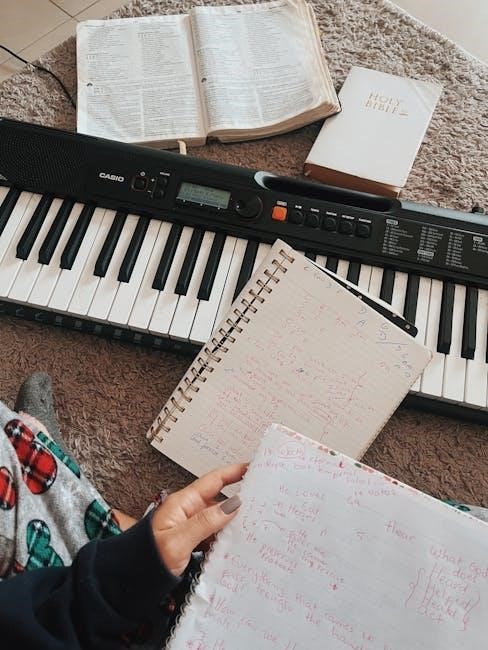Embark on your piano journey with excitement! Starting with the basics is crucial for building a strong foundation. Free PDF piano books offer a variety of songs and exercises, making learning accessible and enjoyable for everyone. These resources provide step-by-step guidance, helping beginners master foundational skills and explore different musical genres. With the right materials, anyone can begin their musical adventure and progress confidently.
1.1 The Importance of Starting with the Basics
Mastering the fundamentals is essential for any beginner. Free PDF piano books for starters focus on building a strong foundation, ensuring proper hand positioning, and introducing basic music theory. These resources help learners avoid common mistakes, such as skipping crucial concepts or neglecting practice. By starting with the basics, beginners establish a solid understanding of rhythm, notes, and technique, making progress more enjoyable and sustainable. This approach also fosters confidence and prepares learners for more complex pieces as they advance.
1.2 Benefits of Using a Piano Book for Beginners
A piano book for beginners offers structured learning, gradual progression, and clear instructions. Free PDF resources provide cost-effective access to essential lessons, exercises, and songs. They cater to various learning styles, ensuring a comprehensive understanding of music theory and practical skills. These books often include engaging content, making the learning process fun and motivating. By using a dedicated piano book, beginners can track their progress, stay organized, and build a solid musical foundation without financial strain.
1.3 Why Free PDF Resources Are Ideal for Starters
Free PDF piano resources are perfect for beginners due to their accessibility and affordability. They provide immediate access to essential lessons, exercises, and songs without financial commitment. These resources are often designed with clear, step-by-step instructions, catering to self-paced learning. Additionally, PDFs are easily downloadable and portable, allowing learners to practice anytime, anywhere. This convenience makes free PDF resources an excellent starting point for those exploring piano learning, ensuring a smooth and encouraging introduction to music education.

Popular Piano Books for Beginners Available as Free PDFs
Discover top-rated piano books like Alfred’s Basic Piano Library and John Thompson’s Easiest Piano Course, available as free PDFs. These resources offer clear lessons, exercises, and songs, perfect for starting your musical journey.
2.1 Alfred’s Basic Piano Library Series
The Alfred’s Basic Piano Library Series is a renowned resource for beginners, offering a comprehensive approach to piano learning. Designed for young starters, it combines music theory, rhythm, and practical exercises in a structured manner. Composed by Gayle Kowalchyk and E.L. Lancaster, this series is known for its clear instructions and engaging content. Available as free PDFs, it provides accessible learning materials, making it ideal for those seeking affordable yet high-quality piano education. Its gradual progression ensures learners build strong foundational skills while enjoying the process.
2;2 John Thompson’s Easiest Piano Course
John Thompson’s Easiest Piano Course is a popular choice for beginners, offering a gentle and enjoyable learning experience. This series is designed to make piano study simple and rewarding, with clear instructions and a focus on gradual progression. Available as free PDF downloads, it provides an accessible way for new learners to grasp basic piano concepts. The course is particularly praised for its effectiveness in helping students develop finger dexterity and musical understanding, making it a trusted resource for both children and adults starting their piano journey.
2.3 “Piano for Beginners” by David Blaise
“Piano for Beginners” by David Blaise is a comprehensive guide tailored for new pianists. This book introduces foundational concepts like the music alphabet and basic rhythms through clear, engaging lessons. Available as a free PDF, it combines theory with practical exercises, making it ideal for self-learners. The course emphasizes fun and creativity, allowing beginners to build confidence while exploring various musical styles. Its structured approach ensures a smooth progression, making it a valuable resource for anyone starting their piano learning journey.
2.4 “Learn & Master Piano” Companion Materials
The “Learn & Master Piano” companion materials are a fantastic resource for beginners, offering a well-rounded learning experience. Available as free PDF downloads, these materials include lessons, exercises, and practice tools. They complement the main course by reinforcing key concepts, such as chords, scales, and rhythm. The structured approach ensures steady progress, while the inclusion of practical application helps learners master skills effectively. These materials are perfect for those seeking a comprehensive and accessible way to enhance their piano learning journey.

Key Features of a Good Beginner Piano Book
A good beginner piano book should offer clear instructions, gradual progression, and practical exercises. It should introduce musical theory basics, ensuring a solid foundation for future learning.
3.1 Simple and Clear Instructional Content
A good beginner piano book should feature simple, clear instructions that avoid complex jargon. Resources like Alfred’s Basic Piano Library and John Thompson’s Easiest Piano Course use straightforward language to guide learners. They often include visual aids like diagrams and illustrations to make concepts easier to grasp. Breaking down complex ideas into manageable parts ensures learners can progress without feeling overwhelmed. This clarity helps build confidence and fosters a smooth transition from basic skills to more advanced techniques.
3.2 Gradual Progression of Lessons
A well-structured piano book for beginners should offer a gradual progression of lessons, ensuring learners build skills methodically. Free PDF resources like Alfred’s Basic Piano Library and John Thompson’s Easiest Piano Course start with basic concepts such as hand positioning and simple melodies. Each lesson introduces new techniques or expands on previous material, allowing learners to progress without feeling overwhelmed. This step-by-step approach helps reinforce foundational skills and builds confidence, making the learning process enjoyable and effective for newcomers to piano playing.
3.3 Inclusion of Practical Exercises
Practical exercises are essential for reinforcing lessons and improving technique. Free PDF piano books often include exercises tailored for beginners, such as finger stretches, scales, and simple melodies. These exercises help build dexterity, coordination, and muscle memory. They also allow learners to apply theoretical knowledge in a hands-on way. By practicing these exercises regularly, beginners can progress smoothly and develop a strong foundation for more complex pieces. This hands-on approach makes learning engaging and effective, ensuring steady improvement over time.
3.4 Musical Theory Basics
Musical theory forms the backbone of piano learning, providing essential knowledge for understanding music. Free PDF books for beginners often include lessons on the music alphabet, notes, rests, dynamics, and rhythm. These basics help learners interpret sheet music and play with accuracy. By introducing theory gradually, these resources ensure a comprehensive understanding without overwhelming students. This foundational knowledge enables beginners to read music confidently and appreciate the structure behind the pieces they play, fostering a deeper connection with their music.

Benefits of Free Piano Sheet Music for Beginners
Free piano sheet music offers cost-effective learning, immediate skill application, and accessibility. It provides a variety of genres, keeping practice engaging and fun for new pianists.
4.1 Cost-Effective Learning
Free piano sheet music eliminates financial barriers, making learning accessible to everyone. Beginners can explore various genres and styles without additional costs. Popular songs and exercises are readily available, ensuring engaging practice. Resources like “Piano for Beginners” by David Blaise offer comprehensive guides at no charge. This affordability allows learners to focus on skill development rather than expenses, fostering a love for music early on. Supplementary materials further enrich the learning experience, all while keeping it budget-friendly and enjoyable;
4.2 Accessibility and Convenience
Free piano sheet music offers unparalleled accessibility and convenience for beginners. With just an internet connection, learners can instantly download resources like “Piano for Beginners” by David Blaise. These PDFs are compatible with various devices, allowing practice anywhere, anytime. The availability of materials from websites such as MakingMusicFun.net ensures that aspiring pianists can access lessons and exercises without physical constraints. This ease of access fosters a flexible learning environment, catering to different schedules and learning preferences, making piano education more approachable than ever.
4.3 Variety of Musical Genres
Free PDF piano books for beginners offer an impressive variety of musical genres, catering to diverse tastes. From classical pieces by renowned composers to modern pop songs, these resources provide a wide range of styles. Beginners can explore genres like jazz, rock, and folk, keeping their practice sessions engaging and fun. This diversity helps develop a well-rounded musical understanding and allows learners to discover their preferences early on, enhancing their overall learning experience and motivation to continue playing the piano.
4.4 Immediate Application of Skills
Free PDF piano books enable beginners to apply their skills immediately, reinforcing learning through practical exercises and songs. This hands-on approach allows learners to connect theory with real-world application, building confidence and mastery. By practicing newly learned concepts in actual pieces, students can see progress quickly, staying motivated and engaged. Immediate application transforms learning into an enjoyable, dynamic process, making free PDF resources invaluable for effective and rewarding piano education from the very start.

Websites Offering Free Piano Sheet Music for Beginners
Discover free piano sheet music for beginners on websites like MakingMusicFun.net, MusicTheory.net, and Piano Nanny. These platforms offer easy access to various genres and learning tools.
5.1 MakingMusicFun.net
MakingMusicFun.net is a top destination for free piano sheet music. It offers professionally arranged beginner pieces in PDF format, ensuring accessibility for all learners. Popular resources include John-Thompson-Easiest-Piano-Course-1.pdf and Piano_for_Beginners_David_Blaise.pdf. These materials cater to young learners, providing a solid foundation in piano skills. The variety of genres and learning tools makes it an ideal starting point for musical exploration. This platform is perfect for enhancing your piano journey with quality, free resources.
5.2 MusicTheory.net
MusicTheory.net is an excellent resource for beginners, offering free online lessons and tools to understand music fundamentals. While it isn’t exclusively a PDF repository, it provides interactive exercises and printable materials that complement piano learning. The site covers essential topics like the music alphabet, rhythm, and chord basics, making it a valuable supplement to your piano book. Its clear structure and practical approach ensure a solid theoretical foundation, which is crucial for progressing in piano studies.
5.3 OpenMusicTheory.com
OpenMusicTheory.com offers a free online textbook that covers music theory comprehensively, which is highly beneficial for piano learners. Although it’s not a PDF-focused platform, the content is accessible and printable, providing clear explanations of musical concepts like scales, chords, and rhythm. The resource is particularly useful for beginners aiming to understand the theory behind their piano practice, ensuring a well-rounded learning experience and enhancing their ability to play with confidence and musicality.
5.4 Piano Nanny
Piano Nanny is a valuable resource for beginners, offering a variety of free and paid piano materials. While the books are primarily for purchase, they are known for their engaging and structured approach, making them ideal for young learners. Parents and teachers appreciate the simple, step-by-step lessons that integrate music theory with fun exercises. Although free PDF samples are limited, the available materials provide a great introduction to piano learning, helping beginners build foundational skills in an enjoyable and interactive way.
5.5 Other Reliable Sources
Beyond the mentioned websites, other platforms offer free piano resources. OpenMusicTheory.com provides free music theory content, while forums like Piano World and Reddit’s r/pianolearnings often share PDF materials. Some educational sites and online libraries offer free piano books, and specific method books like Alfred’s and David Blaise’s can be found across various sources. These additional resources give beginners a wide range of options to explore and enhance their learning journey with diverse materials.
How to Choose the Right Piano Book for Your Needs
Assess your skill level, musical interests, and learning style. Look for books with clear instructions, gradual progression, and practical exercises. Read reviews to ensure compatibility with your goals and preferences for a smooth learning experience.
6.1 Assessing Your Skill Level
Evaluating your skill level is the first step in selecting the right piano book. Beginners should look for resources starting with the music alphabet, basic rhythms, and simple exercises. Free PDF books like Alfred’s Basic Piano Library or John Thompson’s Easiest Piano Course are ideal, as they introduce concepts gradually. Ensure the book aligns with your current knowledge to avoid frustration or boredom. This assessment ensures a smooth and enjoyable learning journey, helping you build a strong foundation step-by-step.
6.2 Identifying Your Musical Interests
Identifying your musical interests helps tailor your learning experience. Determine if you prefer classical, pop, jazz, or other genres. Free PDF piano books often cater to specific styles, such as Piano for Beginners by David Blaise, which offers a variety of genres. Aligning your practice material with your musical preferences keeps learning engaging and fun. This personalization ensures you stay motivated and enjoy the process of mastering the piano, making your journey more fulfilling and tailored to your tastes.
6.3 Reading Reviews and Recommendations
Reading reviews and recommendations is essential for selecting the right piano book. Many free PDF resources, such as Alfred’s Basic Piano Library and John Thompson’s Easiest Piano Course, are highly rated by educators and learners. Reviews often highlight a book’s clarity, structure, and suitability for beginners. Websites like MakingMusicFun.net and forums provide insights into which materials work best for different learning styles. By exploring these recommendations, you can find a book that aligns with your goals and ensures a smooth learning experience.
6.4 Ensuring Compatibility with Your Learning Style
Choosing a piano book that matches your learning style is vital for effective progress. Some learners thrive with visually structured content, while others prefer hands-on exercises or theoretical explanations. Free PDF resources like Alfred’s Basic Piano Library and John Thompson’s Easiest Piano Course offer diverse approaches, catering to different preferences. By selecting a book that aligns with your learning style, you can stay motivated and enjoy a seamless learning experience. This compatibility ensures that your practice is both productive and enjoyable, helping you achieve your musical goals efficiently.

The Role of Music Theory in Beginner Piano Books
Music theory is essential in beginner piano books, providing a solid understanding of notes, rhythm, and chords. It helps learners grasp musical concepts, enhancing their playing skills and appreciation for music. Through structured lessons, theory is introduced in an accessible way, making it easy for newcomers to apply practical knowledge effectively while enjoying their piano journey.
7.1 Understanding the Music Alphabet
Mastering the music alphabet is the first step in any musical journey. It introduces the seven natural notes—A, B, C, D, E, F, G—that form the foundation of music. These notes repeat in octaves on the piano, helping beginners navigate the keyboard. Free PDF resources often include exercises that familiarize learners with note recognition, a skill essential for reading sheet music and understanding scales. This fundamental knowledge builds the groundwork for more complex concepts like chords and rhythm, making it indispensable for beginners.
7.2 Basics of Rhythm and Timing
Understanding rhythm and timing is essential for playing the piano effectively. Rhythm refers to the pattern of sounds in music, while timing ensures notes are played at the correct duration. Beginner piano books often introduce basic rhythmic concepts like whole, half, quarter, and eighth notes, along with rests. These elements help students develop a strong sense of pulse and timing, crucial for executing songs accurately. Free PDF resources provide exercises that make learning rhythm engaging and accessible, ensuring a solid foundation for musical expression.
Chords and scales are fundamental elements in piano learning, providing the building blocks for melodies and harmonies. Beginner piano books introduce basic chords, such as C, G, and Am, and scales like the C Major and G Major scales. These resources often include exercises to help students master proper finger placement and transitions. Understanding chords and scales enhances musical expression and enables learners to play more complex pieces. Free PDF books like “Piano for Beginners” by David Blaise offer clear lessons, making these concepts accessible and easy to practice.
7.4 Practical Application of Theory
Practical application of theory brings music to life! Free PDF books guide beginners in using chords and scales to play real songs. For example, “Piano for Beginners” by David Blaise includes exercises that transition theory into practice, allowing learners to immediately apply concepts. This approach reinforces understanding and builds confidence. By practicing with familiar tunes, students see how theory translates into music, making learning engaging and rewarding. Such resources make complex ideas accessible, ensuring a smooth progression in piano skills.
Additional Resources for Beginner Pianists
8.4 Free Practice Tools and Software
Enhance your learning with free practice tools and software! Apps like Yousician and Fender Play offer interactive lessons, while software such as Synthesia helps you play by ear. These tools provide engaging exercises, progress tracking, and customizable settings to suit your learning style. They complement traditional piano books by offering a modern, tech-driven approach. Perfect for beginners, these resources make practice fun and accessible, ensuring consistent improvement and a deeper connection to your music.
8.1 Video Tutorials and Online Lessons
Video tutorials and online lessons are invaluable for beginners! Platforms like YouTube, Piano Nanny, and MakingMusicFun.net offer free lessons that complement PDF books. These resources provide visual demonstrations, step-by-step instructions, and interactive exercises. They help beginners grasp hand positioning, rhythm, and technique. Many tutorials cover the same songs and exercises found in popular piano books, making them a perfect supplement. Online lessons also allow learners to progress at their own pace and explore diverse musical styles, ensuring a well-rounded learning experience.
8.2 Mobile Apps for Piano Learning
Mobile apps are fantastic tools for beginner pianists! Apps like Piano Maestro, Yousician, and Fender Play offer interactive lessons, exercises, and games to enhance learning. They often work alongside free PDF books, providing audio-visual guidance and real-time feedback. Features include note recognition, rhythm training, and progress tracking. These apps cater to various learning styles, making practice engaging and fun. They’re ideal for supplementing PDF materials, offering a modern, portable way to improve piano skills anytime, anywhere.
8.3 Online Communities and Forums
Online communities and forums are invaluable for beginner pianists! Platforms like Piano World, Reddit’s r/piano, and specialized Facebook groups offer support, advice, and shared experiences. These spaces allow learners to ask questions, share progress, and receive feedback from experienced pianists. Many forums also discuss free PDF resources, providing recommendations and insights. Engaging with these communities fosters motivation and connects you with like-minded individuals, enhancing your learning journey and helping you stay inspired and accountable.
Enhance your piano learning with free practice tools and software! Apps like Synthesia and Yousician offer interactive lessons, while web-based tools like Keyflow and Piano Maestro provide exercises for improving skills. Online keyboards such as Piano Nanny and Sheet Music Archive allow you to practice digitally. These resources complement free PDF books by offering hands-on practice, tempo control, and visual feedback. They are perfect for reinforcing lessons and keeping your practice sessions engaging and productive, ensuring steady progress in your piano journey. Explore these tools to enhance your learning experience today!

Common Mistakes to Avoid When Using Free PDF Books
Avoid common mistakes like skipping basics, irregular practice, poor hand positioning, and ignoring expression. Ensure consistent practice and attention to detail for effective learning.
9.1 Skipping Fundamental Concepts
Skipping fundamental concepts is a common mistake that can hinder progress. Many beginners overlook the importance of understanding the music alphabet, rhythm, and proper hand positioning. Without these basics, playing becomes chaotic. Free PDF books often introduce concepts gradually, but rushing through lessons can lead to poor technique. Consistently practicing foundational exercises ensures a solid musical foundation. Avoid the temptation to jump ahead—mastering basics is essential for long-term success and enjoyment in piano learning.
9.2 Not Practicing Regularly
Irregular practice is a significant obstacle for beginners. Free PDF piano books provide structured lessons, but progress requires consistent effort. Skipping practice sessions hinders muscle memory development and slows skill improvement. Even short daily practice is more effective than sporadic, lengthy sessions. Staying committed ensures steady growth and mastery of techniques. Regular practice aligns with the structured approach of free PDF resources, helping beginners avoid this common pitfall and maintain consistent progress in their learning journey.
9.3 Overlooking Proper Hand Positioning
Proper hand positioning is essential for technique and comfort. Neglecting it can lead to poor finger placement, affecting accuracy and tone. Free PDF piano books often include guides on correct posture and hand alignment. Ignoring these basics may result in discomfort or injury. Consistent attention to hand positioning enhances control and expression, ensuring a strong foundation for future progress. Beginners must prioritize this fundamental aspect to avoid developing bad habits that hinder their musical growth.
9.4 Ignoring Musical Expression
Neglecting musical expression can make playing feel mechanical. Dynamics, tempo, and phrasing bring music to life, yet many beginners overlook these elements. Free PDF piano books often emphasize expression, but it’s up to the learner to practice it. Ignoring expression can result in a lackluster performance, missing the emotional depth music offers. Beginners should focus on feeling and emotion in their playing to enhance their musicality and create engaging performances from the start;
Mastering piano starts with the right resources. Free PDF books offer a gateway to learning, ensuring accessibility and growth. Embrace the journey, practice consistently, and enjoy the music!
10.1 Recap of Key Points
Learning piano as a beginner is made easier with free PDF books. These resources provide foundational skills, gradual progression, and practical exercises. They include essential music theory, ensuring a well-rounded education. Popular series like Alfred’s and John Thompson’s offer structured lessons, while websites like MakingMusicFun.net supply diverse sheet music. Consistent practice, proper technique, and exploring various genres are vital for progress. Utilize these tools wisely to foster a lifelong love for music and mastery of the piano.
10.2 Encouragement for Continuous Learning
Embrace your piano journey with passion and persistence! Celebrate small victories, as each note mastered brings you closer to beautiful music. Free PDF resources offer endless opportunities to explore and grow. Remember, consistent practice and dedication will unlock your full potential. Don’t hesitate to experiment and enjoy the process. Every effort invested in learning will reward you with the joy of creating music and the pride of acquiring a lifelong skill. Keep playing, and let your love for piano guide you forward!
10.3 Final Tips for Successful Piano Learning
Set achievable goals and practice consistently, even for short periods. Use free PDF resources to explore various styles and keep learning fresh. Listen to recordings of pieces you’re studying for inspiration. Prioritize proper hand positioning and musical expression. Seek feedback from teachers or online communities to refine your skills. Embrace challenges as opportunities to grow, and remember, patience and enjoyment are key to a rewarding piano journey. Celebrate progress and stay motivated to achieve your musical aspirations.
